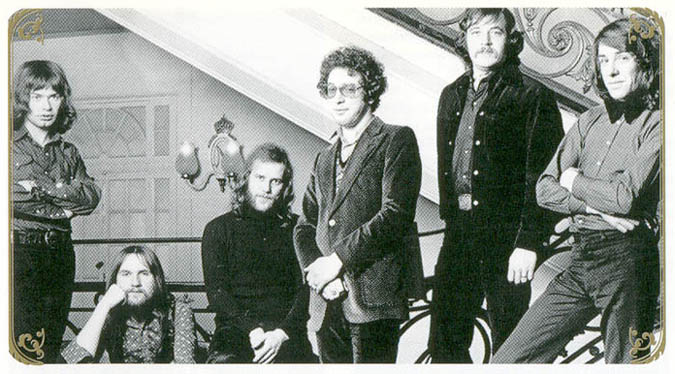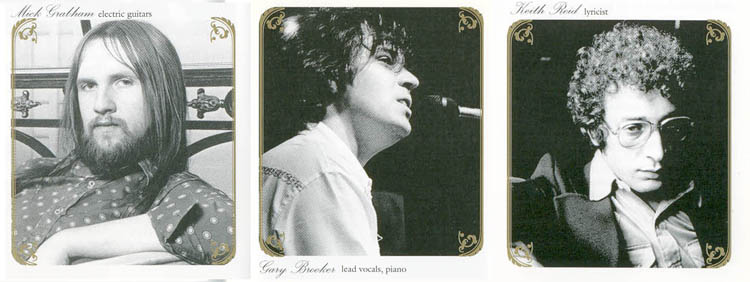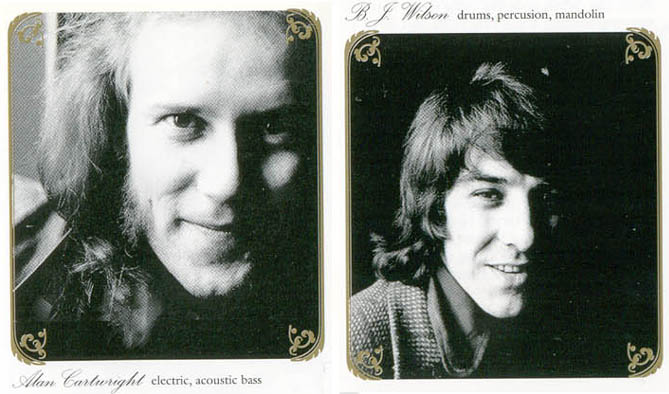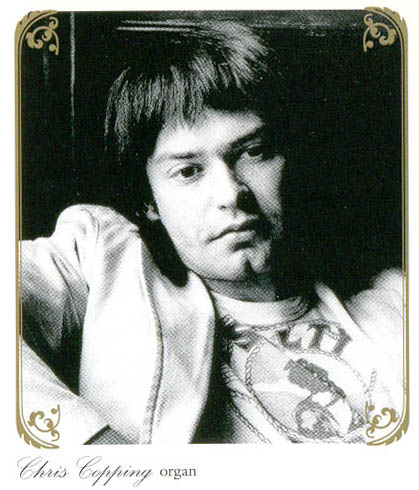|
|
Gary Brooker
– piano, vocal, orchestrations |
||
|
[Bonus track] Grand Hotel (single edit) |
[Bonus track] Robert's Box (single edit) |
||
Procol HarumBeyond
|
|
|
PH on stage | PH on record | PH in print | BtP features | What's new | Interact with BtP | For sale | Site search | Home |
|
Like all the new PH re-releases on Repertoire, this CD comes in a handsome 'digipak' with freshly-written liner notes by Chris Welch, in a liberally illustrated booklet including several hitherto-unknown shots of the band. Not all of them have bonus tracks, but fans will be interested in the quality of the digitally-remastered sound.
"Soundwise my first impression was very positive," wrote audiophile Hermann Braunschmidt to BtP. "Very clear, strong, powerful and loud … I compared the CDs to the old Castle re-releases, and my impression proved to be right that the material was highly compressed (more than 6 dbs) which makes the CDs sound far from a typical mid-seventies production. So definitely not a bad job, and you can expect to hear maximum subjective improvement under listening conditions such as in the car, or on a portable system in the office etc."
|
|
Gary Brooker
– piano, vocal, orchestrations |
||
|
[Bonus track] Grand Hotel (single edit) |
[Bonus track] Robert's Box (single edit) |
||
Liner note:
Grand Hotel – what a splendid and evocative name for a song! A far cry in its tone and aspirations from say, Frank Zappa's 200 Motels or even Elvis Presley's Heartbreak Hotel. This is rock at its most stately, profound and grandiose and entirely in keeping with the aims of that most remarkable band, Procol Harum.
The song, played in waltz time [sic] with orchestral accompaniment, gives its name to one of the most stimulating albums produced by Procol Harum during the early Seventies. It is packed with imaginative, well crafted songs, which combine all the best elements of Procol's unique concept. Keith Reid's inspirational lyrics are interpreted throughout with due care and attention by the maestro, Gary Brooker, while the band underpin their wildest flights of fancy with a rock solid groove.

Procol Harum was formed during the psychedelic era, from the members of The Paramounts, a popular Sixties R&B outfit. The prototype Procol including Gary Brooker (piano, vocals) and Matthew Fisher (organ) caused a sensation with their 1967 debut single, A Whiter Shade of Pale. Its surreal lyrics and haunting Bach-like melody resulted in a huge hit that sold in millions. It was the start of a highly productive career which saw the release of a succession of ground-breaking albums. These included Procol Harum (1967), Shine On Brightly (1968), A Salty Dog (1969), Home (1970) and Broken Barricades (1971). After A Whiter Shade Of Pale topped the UK charts in May, 1967, Procol went on to enjoy hit singles with Homburg, Quite Rightly So, A Salty Dog, Conquistador and Pandora's Box.
Procol Harum underwent a few changes over the years, but the nucleus of the band remained Gary Brooker and 'sixth member' Keith Reid, who provided the lyrics to most of Procol's recordings. The old firm were in fine fettle when it came to this studio offering. It has nine vintage Procol performances, distinguished by the care and imagination which went into all their work.
Sessions for Grand Hotel began during April, 1972 at George Martin's Air Studios, in London's Oxford Street. It was a productive and happy time for the band. Their album Live in Concert With The Edmonton Symphony Orchestra was at Number 5 in the US charts. They also had a big hit single with Conquistador which was at Number 16 in Billboard. The Air Studios sessions saw the regular Procol line up together with some interesting guest musicians. The band at this time included Gary (vocals, piano), Chris Copping (organ), new guitarist Mick Grabham, Alan Cartwright (bass) and BJ Wilson (drums, percussion and mandolins). The visitors included Christianne Legrand (vocals), the Pahene Recorder Ensemble and an orchestra and choir.
The album, which was released in March, 1973 got to Number 21 in the US Billboard chart. The blend of rock, soul and classical overtones that informs so much of Procol's work is perfectly encapsulated on the dazzling opening number. It provides a limousine ride into a past world of forgotten courtesies and splendour, not the sort of thing you normally expect to encounter in the world of rock'n'roll. But then, Procol was no ordinary band.
Our limo takes us to the red carpeted foyer of the Grand Hotel where a tinkling piano provides a warm welcome, as Brooker promises his fellow guests a rare treat. 'Tonight we sleep on silken sheets, we drink fine wine and eat rare meats...amidst [sic] candlelight and chandeliers.' The choir and violins break into a dashing waltz that complements the atmosphere of 19th century dignified opulence. A slightly manic note ensues as the visiting rock band and resident strings engage in an altercation in the lobby, but glasses of champagne are served and Gary's serenade helps restore calm and order.
Gary is particularly proud of this piece which remains a firm favourite with audiences whenever his band takes to the road to perform: "The inspiration for Grand Hotel came from touring. It's a touring song but with a Procol Harum kind of outlook for a change. We've had a few touring songs and this is one of them. Some of them are about self-abuse (!) but this one was the result of touring through Eastern Europe during the early Seventies. Even in Scandinavia in those days they still had orchestras and little string quartets in the hotel dining rooms where the waiters would be dressed in tailcoats and bow ties. We always stayed at good hotels and unlike in Britain, you could find excellent food and first-class service. It's all changed now of course. It's all Formula One motels and you see the same menu everywhere. But in the Seventies the quality of life was sparkling and the lyrics to this song came out of that experience. The music simply reflects on the pleasure of staying in a well-run hotel."

Toujours L'Amour sounds as though it might be a slow ballad, but in fact it's quite a fast tune. Gary explains it's about the break-up of a relationship. "Keith wrote the lyrics and this sort of song is usually about the girl running off and taking everything. That theme is always there in someway [sic] or another. 'She took all the pleasure and none of the pain and she buggered off anyway.' Something like that!"
A Rum Tale is a lugubrious tale full of strange images. Says Gary: "It's a 'She took my money and ran' type of song. I think Keith must have been going through a bad spell. But the song goes 'I'm buying myself an island somewhere in the sun to forget all about it and live only on rum.' It's a waltz and it's always been one of my personal favourites. I was quite proud of having composed it and take great pleasure in trying to play it, ha, ha! It's incredibly difficult with very unusual chords. I don't know where it came from but it came out naturally and quickly. I didn't work for weeks on it. I just banged it out on a cassette. I know that the producer, Chris Thomas tried to get the feeling I got on the cassette on to the record and he thought he never quite achieved it. He always preferred the original first version.
TV Ceasar fulminates against the kings of the TV talk shows, those people who invade our living rooms with an endless flow of opinion and gossip. "I didn't write the lyrics but I think it was meant to be about David Frost who was very big at that time. He was doing a show in New York as well as London and was commuting backwards and forwards across the Atlantic. The line goes 'He holds his court in every house...' They were wonderful lyrics."
A Souvenir Of London is an intriguing idea open to various interpretations, in view of its ominous message that...'There's a lot of it about'.
Gary: "During my career I've had two records banned. One was with The Paramounts when the BBC banned a song we did called Bad Blood because it was allegedly also another expression for venereal disease. But instead of getting a lot of publicity over the ban, nobody seemed to notice! A Souvenir Of London was also banned. Yet if you read between the lines you'll find it was inspired ... by a pencil. It was the sort of gift you could buy in the Oxford Street shops. It would have printed on the side 'A souvenir of London'. Why was it banned? Because it referred to venereal disease! Now and then Procol Harum leans towards the comic. Almost every album has had one slightly comic song like Good Captain Clack and this one was also a bit tongue in cheek. We were recording a lot at Air Studios and in those days there were a lot of street performers around in Oxford Street. So A Souvenir Of London was influenced by that sort of sound. BJ Wilson played a big bass drum and spoons instead of his normal drum kit and we had banjos to make it sound like an old London street song." [compare with Dave Ball's account here]

Bringing Home The Bacon, with its stomping back beat, has long been a popular 'live' number and is regarded as a useful 'starter' for any Procol show. "It's one of those songs that starts the evening well and gives the sound man a chance to adjust his ears as the band comes in gradually. We used the Pahene Recorder Ensemble to back us on this track because we always like the sound of recorders and different instruments. For example BJ Wilson overdubbed 22 mandolins – we counted them!"
The next track begins with a haunting piano melody which complements the poignant story behind its origins. Gary explains the For Liquorice John was about a friend of his from Southend. "His name wasn't really 'Liquorice John'. He was a great character and a huge music fan. Sadly he jumped off the top of a 15 storey building and died shortly before we made the album. Keith very nicely wrote this lyric about him, but it's not a morbid song."
Several of these tracks retain a European flavour, like the rhapsodic Fires (Which Burnt Brightly) which features Christianne Legrand of the famous Swingle Singers, who flew from Paris especially to sing on the track. "Somebody found her number and she was over the next day! She was everything we hoped for as a vocalist. She sang a solo that was absolutely marvelous. I used to listen to the Swingle Singers long before starting Procol Harum and they influenced A Whiter Shade of Pale in some way. This was one of our war songs, but it could also be about somebody's relationships. It goes: 'This war we are waging is already lost. The cause for the fighting has long been a ghost.'"
The final item Robert's Box is a holiday song influenced by the exotic atmosphere of the Caribbean islands. The elaborate arrangement has two other distinct parts, including a chorus which has nothing to do with the verse. "I do recall that much of the whole album is like that. There's a schizophrenic element where lots of the songs are in fact two songs. So you get more for your money! Even Fires (Which Burnt Brightly) has two parts with totally different verses and choruses."
Gary says that as the previous album was In Concert With The Edmonton Symphony Orchestra (1972) and the one before that was Broken Barricades (1971), the band had two years of musical ideas stored up, which came together on Grand Hotel.

"We didn't actually write anything new for the Edmonton album. Then I found myself using a couple of ideas in one song. Another aspect of this album was that after doing Edmonton rather than throw all the orchestral stuff out of the window, this was one last opportunity to do something with an orchestra, but in a more controlled studio environment. As it turned out Grand Hotel was absolutely huge, especially in Europe and it was by far our biggest seller in Britain up to that point."
Procol Harum would go on to make Exotic Birds And Fruit (1974), Procol's Ninth (1975) and Something Magic (1977), which are also available on Repertoire CDs. They broke up in 1977 in the face of punk rock and played a farewell tour, but made a welcome return for their come back album The Prodigal Stranger (1991).
In recent years Gary Brooker has played concerts with a new version of Procol Harum and has toured with Ringo Starr's All Starr Band. Keith Reid, the 'sixth member' of Procol Harum, stopped writing for a few years and lived in America. He has since begun writing again, working with a variety of musicians.
Says Keith: "Gary and I got together in 1991 and wrote a bunch of songs for The Prodigal Stranger. It's a fairly loose arrangement now but it remains a unique partnership. There is still a bit of magic between us."
Much of that magic is to be found amidst the haunting themes of Grand Hotel. There never was a band like Procol Harum, so check in with the desk clerk and book a long stay. You'll enjoy the room service – and the music!
CHRIS WELCH, London, England 2000
The original release of this CD on the Castle Label
More Procol / Brooker re-releases from Repertoire Records
Order this CD from Amazon Germany
Order this CD from Amazon Canada
|
PH on stage | PH on record | PH in print | BtP features | What's new | Interact with BtP | For sale | Site search | Home |